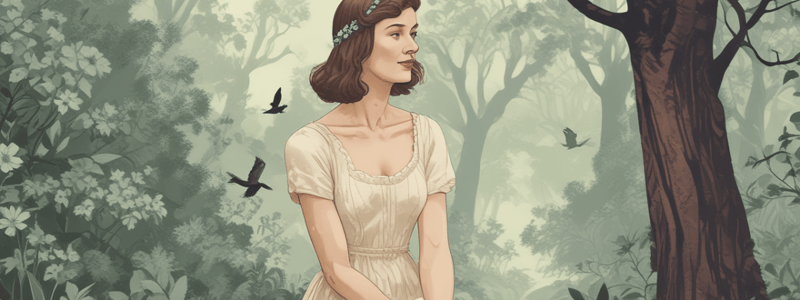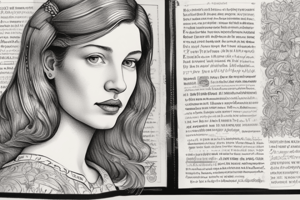Podcast
Questions and Answers
In 'Poppies in July', what does the line "All night your moth-breath flickers among the flat pink roses" reveal about the speaker's feelings towards her daughter?
In 'Poppies in July', what does the line "All night your moth-breath flickers among the flat pink roses" reveal about the speaker's feelings towards her daughter?
The line reveals the speaker's intense love and protective instincts towards her daughter. The "moth-breath" imagery evokes a sense of fragility and tenderness, while the "flat pink roses" symbolize both beauty and the fleeting nature of life.
In 'Poppies in July', how does Plath use sensory imagery in the poem to create a vivid portrayal of motherhood?
In 'Poppies in July', how does Plath use sensory imagery in the poem to create a vivid portrayal of motherhood?
Plath uses a range of sensory imagery, like the "moth-breath" and "flat pink roses", to evoke the delicate and intimate nature of motherhood. She also employs auditory imagery with "a far sea moves in my ear" to illustrate the constant vigilance and attentiveness of a mother.
In 'Poppies in July', explain the significance of the speaker's description of herself as "cow-heavy and floral" in her "Victorian nightgown."
In 'Poppies in July', explain the significance of the speaker's description of herself as "cow-heavy and floral" in her "Victorian nightgown."
The description emphasizes the speaker's raw and unidealized portrayal of motherhood. The "cow-heavy" imagery suggests the physical changes associated with pregnancy and breastfeeding, while the "Victorian nightgown" implies a sense of tradition and timelessness.
In 'Poppies in July', how does the image of Frieda's voice rising "like balloons" symbolize the speaker's feelings for her daughter?
In 'Poppies in July', how does the image of Frieda's voice rising "like balloons" symbolize the speaker's feelings for her daughter?
Flashcards are hidden until you start studying
Study Notes
Morning Song by Sylvia Plath
- The poem is a celebration of the birth of Plath's daughter Frieda, and explores themes of maternal love, womanhood, and motherhood.
- The poem also touches on the idea of matrescence, or the process of becoming a mother.
Style
- The poem features expert use of figurative language, including similes, metaphors, and conceits.
- Each stanza consists of three lines (tercet).
- Caesura is used to create spaces for reflection and contemplation.
- Imagery is used to engage the reader's senses, including auditory, visual, and kinesthetic imagery.
Key Quotes and Analysis
- "Love set you going like a fat gold watch" - a warm and inclusive simile that showcases Plath's adulation for her new child.
- "We stand round blankly as walls" - a metaphor that compares the parents to blank walls, emphasizing their uncertainty and anxiety.
- "I'm no more your mother / Than the cloud that distills a mirror to reflect its own slow / Effacement at the wind's hand" - a conceit that compares Plath to a cloud, highlighting her changing identity as a mother.
- "All night your moth-breath / Flickers among the flat pink roses" - kinesthetic imagery that evokes a delicate and intimate atmosphere.
- "One cry, and I stumble from bed, cow-heavy and floral / In my Victorian nightgown" - a candid self-depiction that highlights Plath's newfound role as a mother.
- "Whitens and swallows its dull stars. And now you try / Your handful of notes; / The clear vowels rise like balloons" - a euphonic image that captures the joy and wonder of Frieda's presence.
Studying That Suits You
Use AI to generate personalized quizzes and flashcards to suit your learning preferences.




